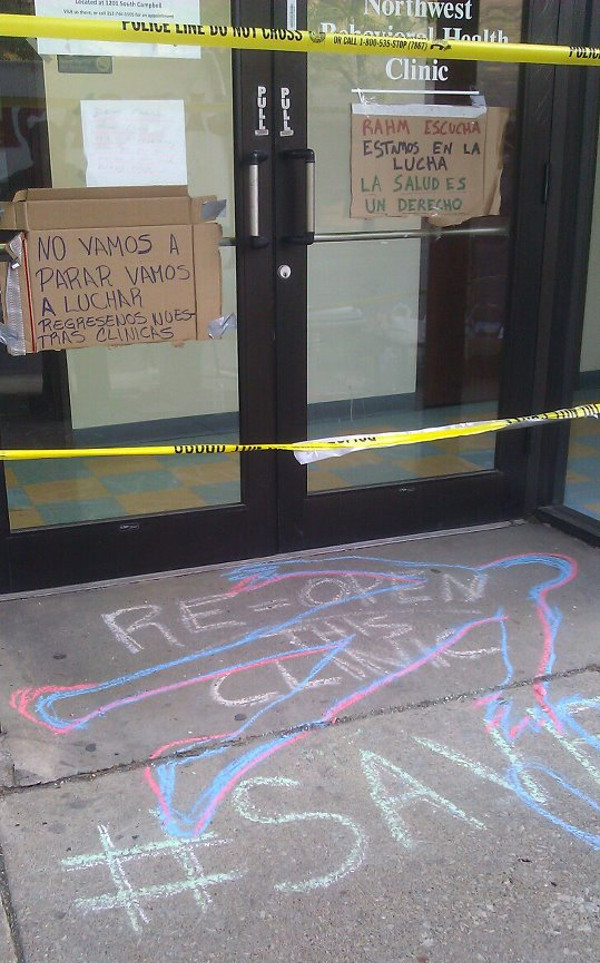
PHOTO/MENTAL HEALTH MOVEMENT
By Kathy Powers, Advocacy is my therapy
CHICAGO, IL — N’Dana Carter from Chicago’s Mental Health Movement organized a Body Bag protest at Mayor Rahm Emanuel’s office on February, 17, 2016, to raise awareness of the widespread seriousness of untreated mental illness and the insufficient safety net afforded by the city’s Department of Public Health. She sees the Emanuel administration’s policies as the cause of Chicago’s current mental health crisis. During his early tenure as mayor, Emanuel closed six of 12 public mental health clinics, leaving five clinics open on the south side—and only one on the north side of the city.
“We had over 400 suicides the year our public mental health clinics closed,” said Carter. “Things are not getting better.”
The Chicago Commissioner of the Department of Public Health, Dr. Julie Morita, refuses to make mental health treatment a priority. When the AFSCME union and Chicago aldermen unveiled a plan this February to expand services at the city’s mental health clinics to potentially steer some troubled youths to treatment rather than street confrontations with police, without increasing city taxes, Dr. Morita said that the plan would not work and would be “counterproductive.” The mental health clinics only treat adults 18 and over.
Chicago socially excludes persons with mental illness by shamefully profiling them. Stigmatizing mental health conditions is bad; stigmatizing treatment, worse; stigmatizing clients by therapists, even worse; and “suicide by cop,” the worst.
People who receive help are more likely to be in control of their torments than those who have not. Still, stigma about persons who receive treatment serves to alert people away from seeking treatment for mental illness. People think that therapy will be held against them, reasonably so, because when they lose legal and civil rights or become physically abused, this cancels a person’s ability to recover and maintain a reasonable quality of life. Chicago encourages denial, medical noncompliance and pretext, thereby destroying a healthy society.
Chicago needs to treat serious mental illness, such as bipolar disorder, schizophrenia, and major depression, like any other medical conditions. To quote the National Alliance for Mental Illness, “Recovery rocks, treatment works!”
Chicago must build treatment capacity using the city’s public mental health clinics. Why? Early intervention critically slows illness progression; prevents disability, homelessness and the justice system involvement; and decreases multiple hospitalizations. City investment in rental subsidies to enable affordable housing for homeless people with serious mental illnesses could help at least one third of the homeless population. Housing plus treatment ($20,000/yr.) is far more humane and cost effective than jailing persons with mental illness, creating more homelessness, or losing precious lives to suicide.
The time for reform is now!
20 percent of Cook County’s correctional population has a mental health condition. Most are in for low-level crimes.
57 percent of Medicaid enrollees have a mental illness. They are expensive because they do not have access to treatment.
It is unknown how many uninsured persons with mental illness do not receive treatment.
Kathy Powers is a lifetime Chicagoan. At 50, Kathy speaks out as the voice of the people. She became a revolutionary activist whose lifelong fight raises unheard voices. She is the Health Care Desk on the People’s Tribune Editorial Board.


Many thanks to Kathy Powers for her activism in the Chicago Mental Health Movement, the Alliance for Community Services, the Illinois Single-Payer Coalition, and other organizations working for social justice, especially justice for people who live with mental illness.
I strongly support mental health treatment to reduce unemployment, drug and alcohol abuse, crime and especially suicide. I have seen people live happy, productive lives with counseling and the medicines they need, but not everyone is born with a family who can afford medical care and not all employers can provide it for their workers. I have voted for Chicago public mental health clinics and always will.
Keep up your support, JC! We cannot afford to lose you now.
Thank you so Ms. Powers! You speaking up has encouraged me to speak up and have motivated me to start making a difference in this world even though I have a mental illness.